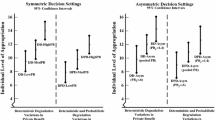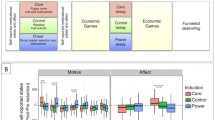Abstract
This paper analyzes the use of a cost-free reward mechanism in the exploitation of a common property resource. We implement an experimental study involving a two-stages game where agents first decide resource appropriation and then have the opportunity to distribute cost-free bestowals. We observe that subjects link the two activities in such a way that appropriation determines the distribution of bestowals which in turn contributes maintaining low appropriation levels, thus avoiding the destruction of the common resource. Not all the potential bestowals are distributed, however.
Similar content being viewed by others

References
Andreoni, J., Harbaugh, W., & Vesterlund, L. (2003). The carrot or the stick: rewards, punishments and cooperation, American Economic Review, 93(3).
Baland, J. M., & Platteau, J. P. (1996). Halting degradation of natural resources. Is there a role for rural communities? London: Oxford University Press.
Baltagi, B. H. (2005). Econometric analysis of panel data (3rd edn.). West Sussex: Wiley.
Bochet, O., Page, T., & Putterman, L. (2006). Communication and punishment in voluntary contribution experiments. Journal of Economic Behavior and Organization, 60, 11–26.
Carpenter, J. P. (2007a). The demand for punishment. Journal of Economic Behavior and Organization, 62, 522–542.
Carpenter, J. P. (2007b). Punishing free-rider: how group size affects mutual monitoring and the provision of public goods. Games and Economic Behavior, 60, 31–51.
Casari, M. (2005). On the design of peer punishment experiments. Experimental Economics, 8, 107–115.
Casari, M., & Plott, C. R. (2003). Decentralized management of common property resources: experiments with a centuries-old institution. Journal of Economic Behavior and Organization, 51(2), 217–247.
Chermak, J. M., & Krause, K. (2002). Individual response, information and intergenerational common pool problems. Journal of Environmental Economics and Management, 43, 47–70.
Cuevas, A., Febrero, M., & Fraiman, R. (2004). An anova test for functional data. Computational Statistics & Data Analysis, 47, 111–122.
Falk, A., Fehr, E., & Fischbacher, U. (2005). Driving forces of informal sanctions. Econometrica, 73(6), 2017–2030.
Falkinger, J. (1996). Efficient private provision of public goods by rewarding deviations from average. Journal of Public Economics, 62, 413–422.
Falkinger, J., Fehr, E., Gächter, S., & Winter-Ebmer, R. (2000). A simple mechanism for the efficient provision of public goods: experimental evidence. American Economic Review, 90(1), 147–264.
Fehr, E., & Gächter, S. (2000). Cooperation and punishment in public goods experiments. American Economic Review, 90(4), 980–994.
Fehr, E., & Gächter, S. (2002). Altruistic punishment in humans, Nature, 415(10).
Fischbacher, U. (1999). z-Tree: Zurich toolbox for readymade economic experiments. Reference Manual and Tutorial, Institute for Empirical Research in Economics, University of Zurich.
Fischer, M. E., Irlenbusch, B., & Sadrieh, A. (2004). An intergenerational common pool resource experiment. Journal of Environmental Economics and Management.
Floristán, A. (1995). Geografía de navarra. Pamplona: Diario de Navarra.
Greene, W. H. (1993). Econometric analysis (2nd edn.). New York: Macmillan Co.
Hey, D. H., Neugebauer, T., & Sadrieh, A. (2009). An experimental analysis of optimal renewable resource management: the fishery. Environmental and Resource Economics, 44, 263–285.
Iriarte Goñi, I. (1996). Bienes comunales y capitalismo agrario en Navarra: 1855–1935. Ministerio de Agricultura, Pesca y Alimentación, España.
Lapuente Martínez (1990). Las Améscoas (Estudio histórico-etnográfico). Junta del Monte Limitaciones de las Améscoas y Gobierno de Navarra.
Masclet, D., Noussair, C., Tucker, S., & Villeval, M. (2003). Monetary and non-monetary punishment in the voluntary contributions mechanism. American Economic Review 93(1).
Mason, C. F., & Phillips, O. R. (1997). Mitigating the tragedy of the commons through cooperation: an experimental evaluation. Journal of Environmental Economics and Management, 34, 148–172.
Moxnes, E. (2000). Not only the tragedy of the commons: misperceptions of feedback and policies for sustainable development. System Dynamics Review, 16(4), 325–348.
Moxnes, E. (2004). Misperceptions of basic dynamics, the case of renewable resource management. System Dynamics Review, 20(2), 139–162.
Nikiforakis, N., & Normann, H. T. (2008). A comparative statics analysis of punisment in public-good experiments. Experimental Economics, 11, 358–369.
Oliver, P. (1980). Rewards and punishments as selective incentives for collective action: theoretical investigations. American Journal of Sociology, 85(6), 1356–1375.
Osés-Eraso, N., Udina, F., & Viladrich-Grau, M. (2008). Environmental versus human-induced scarcity: do they trigger the same response? Environmental and Resource Economics, 40, 529–550.
Osés-Eraso, N., & Viladrich-Grau, M. (2007). On the sustainability of common property resources. Journal of Environmental Economics and Management, 53, 393–410.
Ostrom, E. (1990). Governing the commons. The evolution of institutions for collective action. London: Cambridge University Press.
Ostrom, E., Gardner, R., & Walker, J. (1994). Rules, games and common-pool resources. Ann Arbor: University of Michigan Press.
Ostrom, E., Walker, J., & Gardner, R. (1992). Covenants with and without a sword: self-governance is possible. American Political Science Review 86(2).
Sefton, M., Shupp, R., & Walker, J. (2007). The effects of rewards and sanctions in provision of public goods. Economic Inquiry, 45(4), 671–690.
Spagnolo, G. (1999). Social relations and cooperation in organizations. Journal of Economic Behavior and Organization, 38, 1–25.
Sutter, M., Haigner, S., & Kocher, M. G. (2010). Choosing the carrot or the stick? Endogenous institutional choice in social dilemma situations. Review of Economic Studies, 77, 1540–1566.
Wooldridge, J. M. (2002). Econometric analysis of cross section and panel data. Cambridge: MIT Press.
Author information
Authors and Affiliations
Corresponding author
Additional information
Financial support by the Spanish Ministry of Science and Technology (project ECO2009-12836) is gratefully acknowledged. Montserrat Viladrich-Grau acknowledges the support of the Barcelona Graduate School of Economics Research Network and of the Government of Catalonia. We thank Frederic Udina, Jordi Brandts, Emilio Domínguez, Jorge Nieto and members of SEED research group for helpful comments and discussions. We also thank the helpful comments of two anonymous referees.
Rights and permissions
About this article
Cite this article
Osés-Eraso, N., Viladrich-Grau, M. The sustainability of the commons: giving and receiving. Exp Econ 14, 458–481 (2011). https://doi.org/10.1007/s10683-011-9276-6
Received:
Accepted:
Published:
Issue Date:
DOI: https://doi.org/10.1007/s10683-011-9276-6



